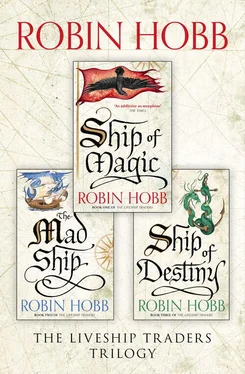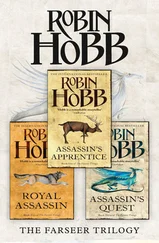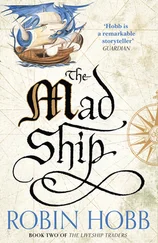She hurried clumsily through the crowded summer market, bumping into folk, knocking against a table full of scarves when she turned to look back over her shoulder. There was no sign of Amber following her. She moved on more purposefully down the walk. Her pounding heart slowed and she became aware of how she was sweating in the afternoon sun. Her encounters with the ship and Amber had left her dry-mouthed and almost shaky. Silly. Ridiculous. All the woman had done was look at her. Where was the threat in that? She had never before been prone to such flights of fancy. Likely it was the stress of the last two days. And she could not recall when she had last eaten a decent meal. Come to think of it, other than beer, she had had almost nothing since the day before yesterday. That was most likely what was wrong with her.
She found a back table in a small streetfront tea shop, and sat down. She felt limply grateful to be out of the afternoon sun. When the boy came to the table, she ordered wine and smoked fish and melon. After he had bowed and gone, she belatedly wondered if she had enough coin to pay for it. When she had dressed so carefully that morning, she had not given any thought to such things. Her room at home was as immaculately tidy as it always was when she had returned to it after a sea voyage. There had been some coins and notes in the corner of her drawer; these she had scooped and stuffed in her pockets before she tied them on, more out of habit than anything else. Even if there was enough to pay for this simple meal, there was certainly not enough to pay for an inn room somewhere. Unless she wanted to go crawling home with her tail between her legs, she’d better think of what she actually planned to do to get by.
While she was still wrestling with that, the food came. She recklessly called for wax and pressed her signet ring into a blotch on a tally stick. Probably the last time she’d get away with sending the bill to her father’s house. If she’d thought of that, she would have let Keffria buy her a more elegant meal. But the melon was crisp and sweet, the fish moistly smoked and the wine was, well, drinkable. She had had worse before and would no doubt have worse again. She just had to persevere and things would get better with time. Things had to get better.
As she was finishing her wine, it came to her in a sudden rush that her father was still dead, and he was going to be dead for the rest of her life. That part of her life was never going to get better. She had almost become accustomed to her grief; this new sense of deep loss jellied her legs. No matter how long she managed to hang on, Ephron Vestrit wasn’t going to come home and straighten it all out. No one was going to make it all right unless she did it herself. She doubted Keffria’s ability to manage the family fortunes. Keffria and her mother might have handled things well enough, but Kyle was going to be stirring the pot, too. Leaving herself entirely out of the picture, how bad could things get for the Vestrits?
They could lose everything.
Even Vivacia.
It had never quite happened yet in Bingtown, but the Devouchet family had come close. They had sunk themselves so deeply in debt that the Traders’ Council had agreed that their main creditors, Traders Conry and Risch, could take possession of the Devouchet liveship. The eldest son was to have remained aboard the ship as an indentured servant to them until the family debts were paid, but before the settlement had been finalized, that same son had brought the ship into port at Bingtown with a cargo rich enough to satisfy their creditors. The whole town had rejoiced in his triumph, and for a time he had been a sort of hero. Somehow Althea could not see Kyle in that role. No. More likely he would surrender both ship and son to his creditors, and tell Wintrow it was his fault.
With a sigh, she forced her mind back to that which she feared most. What was happening to Vivacia? The ship was but newly quickened; liveship lore claimed that her personality would develop over the next few weeks. All agreed there was really no predicting what temperament a ship might have. A ship might be markedly like its owners, or amazingly different. Althea had glimpsed a ruthlessness in Vivacia that chilled her. In the weeks to come, would that trait become more marked, or would the ship suddenly evince her father’s sense of justice and fair-play?
Althea thought of Kendry, a notoriously wilful ship. He would not tolerate live cargo in his hold and he hated ice. He’d sail south to Jamaillia willingly enough, but sailors declared that working his decks on a trip north to Six Duchies or beyond was like sailing a leaden ship. On the other hand, given a fragrant cargo and a southern destination, the ship would fair sail himself, swift as the wind. So a strong will in a ship was not so terrible a thing.
Unless the ship went mad.
Althea poked at the last bit of fish on her plate. Despite the warmth of the summer day, she felt cold inside. No. Vivacia would never become like Paragon. She could not. She was properly quickened, with ceremony and welcome, after three full lifetimes of sailing had been put into her. All knew that was what ruined Paragon. The greed of the owners had created a mad liveship, and brought death and destruction on their family line.
The Paragon had had but one lifetime when Uto Ludluck assumed command. All said that Uto’s father Palwick had been a fine Trader and a great captain. Of Uto, the kindest thing that could be said was that he was shrewd and cunning. And willing to gamble. Anxious to pay off the liveship in his lifetime, he had sailed the Paragon always overloaded. Few sailors cared to ship aboard him twice, for Uto was a harsh taskmaster, not only with his underlings but with his young son Kerr, the ship’s boy. There were rumours that the unquickened ship was difficult to handle, though most blamed it on too much canvas and too little free board due to Uto’s greed.
The inevitable happened. There came a winter day in the storm season when the Paragon was reported as overdue. Setre Ludluck haunted the docks, asking word of every ship that came in, but no one had seen the Paragon or had word of her husband and son.
Six months later, the Paragon came home. He was found floating in the mouth of the harbour, keel up. At first no one knew who the derelict was; only that from the silver wood it was a liveship. Volunteers in dories towed the ship into the beach and anchored it there until a low tide could ground it and reveal the disastrous news it bore. When the retreating waters ebbed away, there lay the Paragon . His masts had been sheared away from the ferocity of some killer storm, but the hardest truth was on his deck. Lashed so securely to his deck that no storm or wave could loose it were the remains of his final cargo. And tangled in the cargo net were the fish-eaten remains of Uto Ludluck and his son Kerr. The Paragon had brought them home.
But perhaps most horrible of all was that the ship had quickened. The deaths of Uto and Kerr had finished out the count of three lives ended aboard him. As the water slipped away to bare the figurehead, the bearded countenance of the fiercely carved warrior cried out aloud in a boy’s voice, ‘Mother! Mother, I’ve come home!’
Setre Ludluck had shrieked and then fainted. She was borne away home, and refused ever after to visit the sea wall in the harbour where the righted Paragon was eventually docked. The bereft and frightened ship was inconsolable, sobbing and calling for days. At first folk were sympathetic and made efforts to comfort him. Kendry was tied up near him for close to a week, to see if the older ship could not soothe him. Instead Kendry became agitated and difficult and eventually had to be moved. And Paragon wept on. There was something infinitely terrible in that fierce, bearded warrior with the muscled arms and hairy chest, who sobbed like a frightened child and begged for his mother. From sympathy, folk’s hearts turned to fear, and finally a sort of anger. It was then that Paragon earned a new name for himself: Pariah, the outcast. No ship’s crew wanted to tie up alongside him; bad luck, sailors nodded to one another, and left him to himself. The ropes that bound him to the docks grew soft with rot and heavy with barnacles. Paragon himself grew silent, save for unpredictable outbursts of savage cursing and wailing.
Читать дальше











